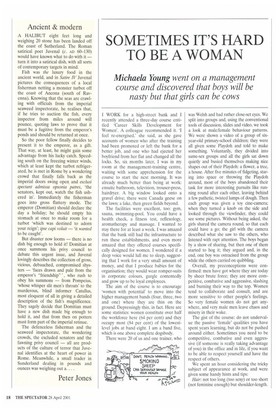Ancient & modern
A HALIBUT eight feet long and weighing 20 stone has been landed off the coast of Sutherland. The Roman satirical poet Juvenal (c. AD 60-130) would have known what to do with it — turn it into a satirical dish, with all sorts of contemporary targets in mind.
Fish was the luxury food in the ancient world, and in Satire IV Juvenal pictures the consequences of a local fisherman netting a monster turbot off the coast of Ancona (south of Ravenna). Knowing that the seas are crawling with officials from the imperial seaweed inspectorate, he realises that, if he tries to auction the fish, every inspector from miles around will pounce, quoting laws to prove that it must be a fugitive from the emperor's ponds and should be returned at once.
So the poor fellow finally decides to present it to the emperor, as a gift. That way, at least, he might gain some advantage from his lucky catch. Speeding south on the freezing winter winds, which at least kept the turbot refrigerated, he is met in Rome by a wondering crowd that finally falls back as the imperial doors swing open. and &dust spectant admissa opsonia patres, 'the senators, kept out, watch the fish ushered in'. Immediately the fisherman goes into gross flattery mode. The emperor (Domitian) should declare the day a holiday; he should empty his stomach at once to make room for a turbot 'which was destined to adorn your reign'; ipse capi voluit — 'it wanted to be caught'.
But disaster now looms — there is no dish big enough to hold it! Domitian at once summons his privy council to debate this urgent issue, and Juvenal lovingly describes the collection of gross, vicious, debauched, compromised shysters — 'faces drawn and pale from the emperor's "friendship" ' , who rush to obey his summons — from Pompeius, 'whose whisper slit men's throats' to the murderous, blind informer Catullus, most eloquent of all in giving a detailed description of the fish's magnificence. They sagely decide that Domitian must have a new dish made big enough to hold it, and that from then on potters must form part of the imperial retinue.
The defenceless fisherman and the seaweed inspectorate, the wondering crowds, the excluded senators and the fawning privy council — all are products of the culture of terror that Juvenal identifies at the heart of power in Rome. Meanwhile, a small trader in Sunderland dealing in pounds and ounces was weighing out a. . .
Peter Jones


































































 Previous page
Previous page